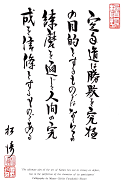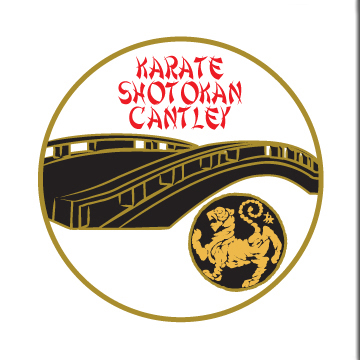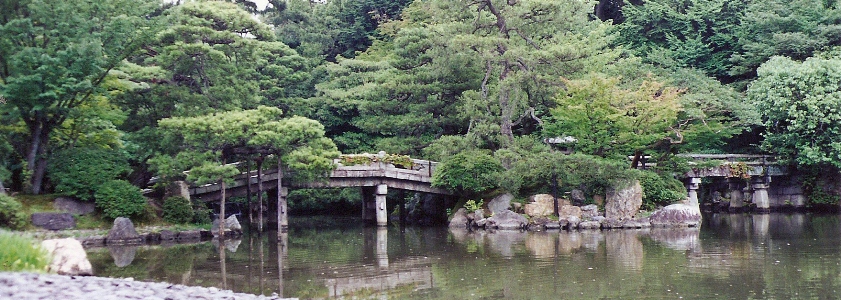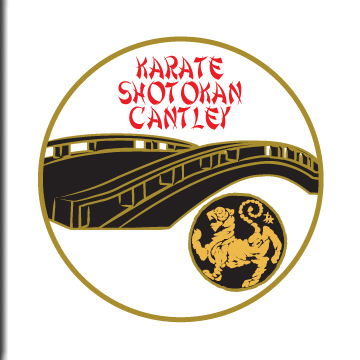Dojo kun

In Karate, the training area is called dojo. The word Dojo breaks up into two characters Do and Jo, the first meaning “the way”, and the second meaning 'the place'. The dojo is thus the place where the way is sought. There is a code of ethics associated called the Dojo kun which defines the values necessary for the physical and philosophical practise of karate. It is defined as being the set of the rules (Kaisetsu) followed in a dojo.
1. Seek the perfection of character (Jinkaku kansei ni tsutomuru koto)
The ultimate goal of karate do. The first precept does not give the priority to developing force, speed, the technical level or the aptitude for combat, but for the improvement of the character of the pupil. This is what Master Funakoshi Gichin insisted was the most important in his writings. The teaching of traditional karate aims at positively influencing the character of the karateka. The respect of the partner, determination, sincerity, effort and self-control are important values in Karate.
2. Be Faithful (Makoto no michi o mamoru koto)
The Way must be true, honest, i.e. not to be a method of self indulgence. Those who do not show honesty in the research of the way of karate become victims of their illusions. Be humble and faithful to your martial arts, your instructor, your seniors, your training partners, and all those which came before you. But just as important it is necessary to be faithful to oneself.
3. Endeavor (Doryoku no seishin o yashinau koto)
Traditionally, the martial arts were never taught or practised as entertainment, thus patience is necessary if the student desires to learn all the aspects of karate. To imitate the movements will not be enough, you must develop and understanding of what you practise when you practise it. This requires focus and complete engagement in the effort. To get there, you will have to persevere and learn how to develop your patience.
4. Respect Others (Reigi o omonzuru koto)
It simply means to practise courtesy, respect, and etiquette. Act towards others as you would like others to act towards you.
5. Refrain From Violent Behaviour (Kekki no yuo imashimuru koto)
To refrain from any violent behaviour, to control your emotions is extremely important. The best confrontation will always be the one that is avoided; it is preferable to avoid a confrontation than to seriously injure someone. Self-defence should only be used when no other recourse is possible - when there is no alternative.
Competitive Karate versus Traditional Karate
Since Karate was introduced in the orient at the beginning of the Fifties, the sporting and competitive form of Karate have constantly been evolving.
What is traditional Karate anyway?
A definition of traditional Karate that I like is: a martial arts from Okinawa which teaches us to use our body (feet, fists, knees, elbows, etc) to strike a decisive and controlled blow to neutralize an attacker.
Please remember that Karate is a martial art (art of the war) and that the principle of the single blow which wounds, invalidates or kills the attacker goes back to the time when one learned karate to defend his life.
Traditional karate also teachers some “mystical” aspects of martial arts, the union between the body and the spirit, the control of energies (chi) and the use of the pressure points are examples.
In our modern society, one finds a competitive aspect in almost everything we do, no wonder competitive karate is so popular. Competition is very attractive, especially to the younger people, one more reason, for many, to favour its development since it will attract more customers.
In sport karate, one learns how to score points. The sport karate student learns how to make light and controlled contact. Technical quality, the potential power and precision have little or no importance. In kumite (fighting) it is the first contact that counts, ignoring entirely the defensive dimension of karate.
An analogy can be made between sport karate and Olympic fencing, I am pretty sure that today’s fencer wouldn’t live very long if facing D'Artagnan of 17th century France.
Competitive karate like any other competitive sport requires a lot of training, the majority of successful competitors take their “retirement” around thirty and either become trainers or simply stop. Less gifted karatekas get frustrated more quickly and give up after a few months or years.
Will traditional karate disappear or be replaced? No. Evolve? Yes because there must be a balance between the last century’s concepts and philosophy and today’s reality.
One should not practice karate to win medals or to be the best, like Master Gichin Funakoshi wrote:
"The Ultimate goal of the Art of Karate is not victory or defeat, but rather in the perfection of the character of its participants."


